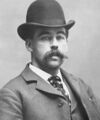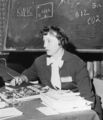Template:Selected anniversaries/November 17: Difference between revisions
No edit summary |
No edit summary |
||
| (2 intermediate revisions by the same user not shown) | |||
| Line 10: | Line 10: | ||
||1749: Nicolas Appert born ... chef, invented canning. Pic. | ||1749: Nicolas Appert born ... chef, invented canning. Pic. | ||
||1776: James Ferguson dies | File:James_Ferguson.jpg|link=James Ferguson (nonfiction)|1776: Astronomer, instrument maker, and author [[James Ferguson (nonfiction)|James Ferguson]] dies. | ||
||1833: Joseph Williams Lovibond born ... brewer who developed the world's first practical colorimeter as a means of ensuring the high quality of his beer. He was the originator of the Degrees Lovibond scale. Pic search. | ||1833: Joseph Williams Lovibond born ... brewer who developed the world's first practical colorimeter as a means of ensuring the high quality of his beer. He was the originator of the Degrees Lovibond scale. Pic search. | ||
| Line 17: | Line 17: | ||
||1884: Physicist and engineer Pál Selényi born. He was a pioneer of xerography. Pic. | ||1884: Physicist and engineer Pál Selényi born. He was a pioneer of xerography. Pic. | ||
File:H. H. Holmes.jpg|link=H. H. Holmes (nonfiction)|1894: [[H. H. Holmes (nonfiction)|H. H. Holmes]], one of the first modern serial killers, is arrested in Boston, Massachusetts. | File:H. H. Holmes.jpg|link=H. H. Holmes (nonfiction)|1894: [[H. H. Holmes (nonfiction)|H. H. Holmes]], one of the first modern serial killers, is arrested in Boston, Massachusetts. | ||
| Line 45: | Line 43: | ||
||1947: American scientists John Bardeen and Walter Houser Brattain observe the basic principles of the transistor, a key element for the electronics revolution of the 20th century. Pics. | ||1947: American scientists John Bardeen and Walter Houser Brattain observe the basic principles of the transistor, a key element for the electronics revolution of the 20th century. Pics. | ||
||1958: Yutaka Taniyama dies ... mathematician known for the Taniyama–Shimura conjecture. Pic. | ||1958: Yutaka Taniyama dies ... mathematician known for the Taniyama–Shimura conjecture. Pic. | ||
| Line 53: | Line 49: | ||
||1970: Luna program: The Soviet Union lands Lunokhod 1 on Mare Imbrium (Sea of Rains) on the Moon. This is the first roving remote-controlled robot to land on another world and is released by the orbiting Luna 17 spacecraft. | ||1970: Luna program: The Soviet Union lands Lunokhod 1 on Mare Imbrium (Sea of Rains) on the Moon. This is the first roving remote-controlled robot to land on another world and is released by the orbiting Luna 17 spacecraft. | ||
File:Nixon April-29-1974.jpg|link=Watergate scandal (nonfiction)|1973: [[Watergate scandal (nonfiction)|Watergate scandal]]: In Orlando, Florida, U.S. President Richard Nixon tells 400 Associated Press managing editors "I am not a crook." | File:Nixon April-29-1974.jpg|link=Watergate scandal (nonfiction)|1973: [[Watergate scandal (nonfiction)|Watergate scandal]]: In Orlando, Florida, U.S. President Richard Nixon tells 400 Associated Press managing editors "I am not a crook." | ||
||1973: The Athens Polytechnic uprising against the military regime ends in a bloodshed in the Greek capital. | ||1973: The Athens Polytechnic uprising against the military regime ends in a bloodshed in the Greek capital. | ||
||1986: Harold Grad dies ... applied mathematician. His work specialized in the application of statistical mechanics to plasma physics and magnetohydrodynamics. Pic. | ||1986: Harold Grad dies ... applied mathematician. His work specialized in the application of statistical mechanics to plasma physics and magnetohydrodynamics. Pic. | ||
File:Robert Hofstadter.jpg|link=Robert Hofstadter (nonfiction)|1990: Physicist and academic [[Robert Hofstadter (nonfiction)|Robert Hofstadter]] dies. He shared the 1961 Nobel Prize in Physics (together with [[Rudolf Mössbauer (nonfiction)|Rudolf Mössbauer]]) "for his pioneering studies of electron scattering in atomic nuclei and for his consequent discoveries concerning the structure of nucleons". | File:Robert Hofstadter.jpg|link=Robert Hofstadter (nonfiction)|1990: Physicist and academic [[Robert Hofstadter (nonfiction)|Robert Hofstadter]] dies. He shared the 1961 Nobel Prize in Physics (together with [[Rudolf Mössbauer (nonfiction)|Rudolf Mössbauer]]) "for his pioneering studies of electron scattering in atomic nuclei and for his consequent discoveries concerning the structure of nucleons". | ||
| Line 71: | Line 61: | ||
||2015: Irma M. Wyman dies ... early computer engineer and the first woman to become vice president of Honeywell, Inc. She was a systems thinking tutor and was the first female CIO of Honeywell. Pic search. | ||2015: Irma M. Wyman dies ... early computer engineer and the first woman to become vice president of Honeywell, Inc. She was a systems thinking tutor and was the first female CIO of Honeywell. Pic search. | ||
</gallery> | </gallery> | ||
Latest revision as of 16:13, 7 February 2022
1790: Mathematician and astronomer August Ferdinand Möbius born. He will discover the Möbius strip, a non-orientable two-dimensional surface with only one side when embedded in three-dimensional Euclidean space.
1776: Astronomer, instrument maker, and author James Ferguson dies.
1894: H. H. Holmes, one of the first modern serial killers, is arrested in Boston, Massachusetts.
1924: Information scientist Claire Kelly Schultz born. A "documentalist", she was particularly known for her work in thesaurus construction and machine-aided indexing, innovating techniques for punch card information retrieval.
1925: Mathematician and social activist Alice Beta interviews famed inventor and data processing pioneer Herman Hollerith.
1929: Inventor Herman Hollerith dies. He will later be recognized as a pioneer of data processing.
1973: Watergate scandal: In Orlando, Florida, U.S. President Richard Nixon tells 400 Associated Press managing editors "I am not a crook."
1990: Physicist and academic Robert Hofstadter dies. He shared the 1961 Nobel Prize in Physics (together with Rudolf Mössbauer) "for his pioneering studies of electron scattering in atomic nuclei and for his consequent discoveries concerning the structure of nucleons".







